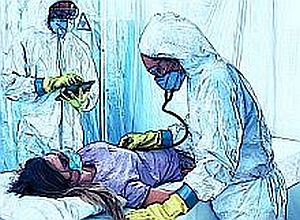Despite talk by KwaZulu-Natal Health MEC, Nomagugu Simelane-Zulu about how superior public facilities in the province are to private hospitals, most COVID-19 patients are opting for private care, according to a Daily Maverick analysis.
Ideology and the ability to talk the political talk has, until now, served Simelane-Zulu, well, writes Des Erasmus in Daily Maverick.
A dyed in the wool cadre, Simelane-Zulu is fluent in speaking all of the tongues the ANC has on offer, but her management will be tested as KZN battles through its COVID-19 surge, led by a department that has been stripped of credibility and ability due to decades of mismanagement, incompetence and graft.
During the department’s budget vote this year, Simelane-Zulu told the KZN Legislature that “contrary to perceptions that the private sector provides a superior level of care, a disproportionate number of the COVID-19 deaths came from the private sector”. She said this raised “serious questions about the quality of care rendered, as well as (the private sector’s) preparedness to deal with an epidemic of this magnitude”. Government infectious disease specialists had to lend “their support and expertise to the private sector” she added.
But, Erasmus writes, the truth is that most COVID-19 patients in the province have opted for private care if care is needed, and if they can afford it, unwilling to try one of KZN’s state-run hospitals or “flu clinics” – which have been established at hospitals to screen for COVID-19.
He writes that it was at one of these flu clinics that 67-year-old Sibusiso Khumalo died over the weekend, having been admitted with chest pains and difficulty breathing. The clinic was a quasi tent-like structure erected in the parking lot of the Northdale Hospital in Pietermaritzburg, where temperatures plummet in winter. Khumalo’s daughter told News24 that her father’s death was “noted as hypoxia”, but that his COVID-19 test results were still outstanding.
To her credit, Simelane-Zulu immediately suspended the hospital’s medical and nursing managers. An investigative team from the University of KwaZulu-Natal was asked to probe the incident. As of 26 July, 78% of all hospitalised COVID-19 patients in KZN were in private health facilities.
The MEC croons the gospel according to the proposed National Health Insurance (NHI), believes the provincial health department is capable of handling (nay, excelling with) the NHI, and is quite clearly suspicious of any private medical service or help, although she pays lip service to the idea – a necessity in her position, given the chances of investment from those greedy capitalists.
To date, it remains unclear if she has signed service level agreements (SLAs) with private sector hospital groups should help be needed to manage COVID-19 cases.
Erasmus quotes Netcare’s director for strategy and health policy, Melanie da Costa, as saying: “The SLAs are either signed or well advanced in the Western Cape, Gauteng, Limpopo, North West, Eastern Cape and KwaZulu-Natal provinces.”
He says Netcare’s cryptic response is matched by the arrogance of the provincial health department, which didn’t answer the same question, or any others submitted, including whether an SLA was in place with private pathology laboratories. The provincial DA says no such agreement exists.
The two state testing facilities – one at Chief Albert Luthuli Hospital and another at Addington Hospital – can conduct 2,700 tests per day, according to the DA. The party says the current backlog sits at 9,500 samples. This, writes Erasmus, has led to delays of up to 14 days for those relying on the state to receive their COVID results. In contrast, the private sector takes anything from 24 hours to a maximum of five days for tests to be conducted and results returned.
Waiting 10 to 14 days for a result makes testing pointless as the patient is either taking up a bed in a COVID-19 facility or is continuing with his or her daily life and possibly infecting others.
Still, Erasmus says, Simelane-Zulu remains a giddy cheerleader for her department, defending it at any opportunity. And unlike her predecessor, who now heads up the national oversight committee on health despite myriad controversies, she has the drive and political ambition necessary to clean house, but it will be a painful, embarrassing clean-up that should – if done correctly – lead to numerous dismissals, and criminal and civil cases being laid.
Erasmus writes that COVID-19 has been a kind of twisted blessing for KwaZulu-Natal Health – a nasty, deadly one, but a blessing nevertheless. It has enabled the department to temporarily shift focus from things like unacceptably high maternal mortality rates at government facilities – currently at 77 per 100,000, down from 100 per 100,000 in 2018/2019.
Too, focus on its medico-legal claims – in excess of R20bn – can be temporarily eased as it deals with the virus, as can dealing with an estimated 40% understaffing at public facilities.
He says KwaZulu-Natal is speeding into its COVID-19 surge, and despite what happens in the coming weeks, Simelane-Zulu and Premier Sihle Zikalala will certainly laud their (read that as the ANC’s) handling of the outbreak as it peaks and eventually dissipates.
Erasmus writes that KZN’s saving grace may well be that the anticipated unmanageable strain on the nation’s public facilities will probably be less than projected, as is being witnessed in other provinces, with bed space still available. However, the strain on healthcare workers remains.
[link url="https://www.dailymaverick.co.za/article/2020-08-07-after-r45bn-in-irregular-expenditure-over-10-years-kzn-health-department-ill-prepared-for-covid-19-storm/"]Full Daily Maverick analysis[/link]

